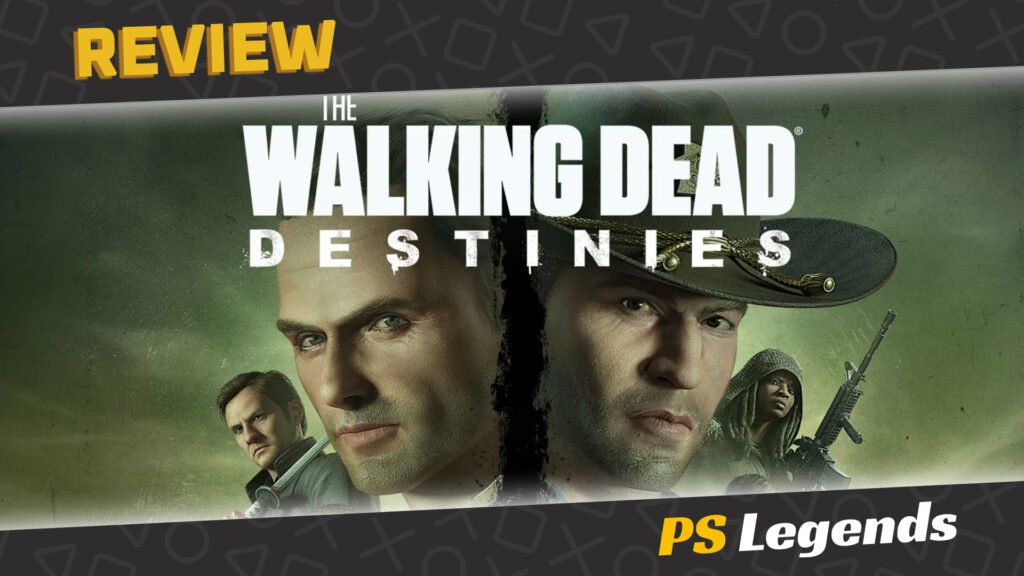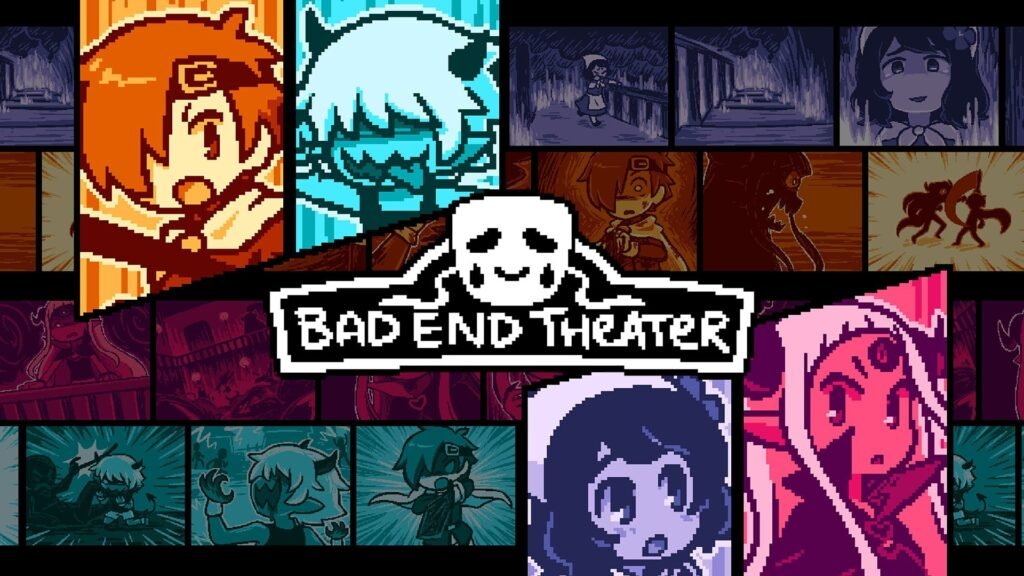Writers note-I would just like to apologise to anyone who was convinced to buy this awful game by my Walking Dead Destinies (WDD) preview article. I was genuinely naïve and believed this could be a great and interesting game…I was wrong.
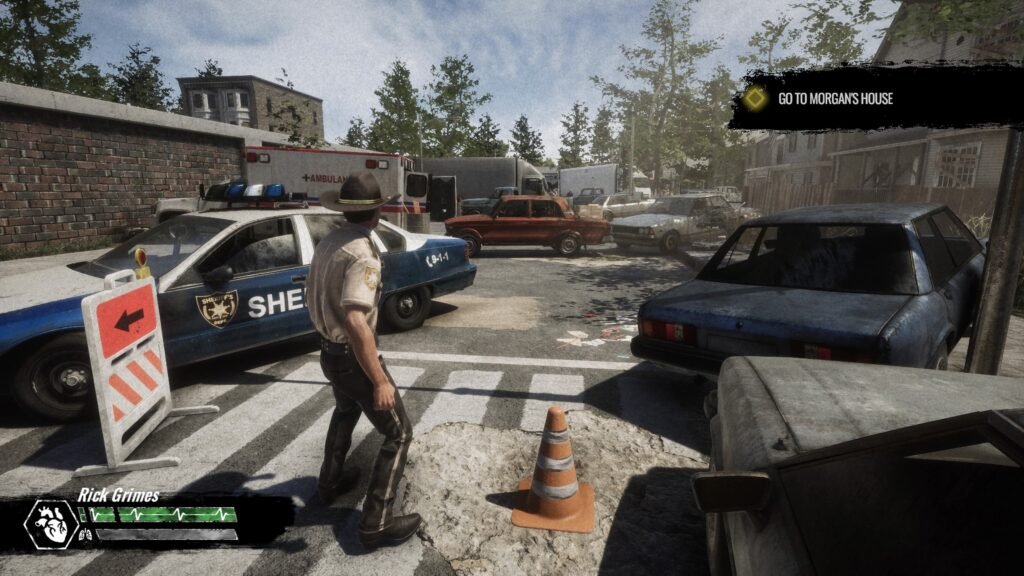
Overview
The Walking Dead franchise has had a rocky history with video game adaptations, often struggling to truly capture the essence of the beloved television series. There are numerous mobile games…which are fine. There are the point and click Telltale titles which are genuinely phenomenal, there was also The Walking Dead Survival Instinct which served as a prequel to the TV series showing how Daryl and Merle got to Atlanta. Survival Instinct actually wasn’t too bad, it wasn’t a Red Dead Redemption 2 blockbuster, but it was pretty fun. The latest attempt, The Walking Dead: Destinies is by far the worst one…by far, not even the worst Walking Dead game it really could be the worst game ever. We are talking Ride to Hell Retribution or E.T levels of bad here.
Published by GameMill Entertainment, the same company responsible for the ill-fated Skull Island. Destinies is a total mess in almost every sense (you may get tired of me saying this). While most disastrous games have at least a few redeeming qualities, it’s hard to find any in this title. Conceptually, Destinies has a massively intriguing premise, covering the first three and a half seasons of the TV show and allowing players to make key decisions that could theoretically alter the story. However, the game fails so spectacularly in execution that even its most basic ideas fall flat.
The premise of altering the fates of key characters is interesting on paper, Disney for instance have made Marvel and pretty soon Star Wars ‘what if?’ Series. But for this game in practice, it’s implemented in the most uninspired way possible. Who lives or dies has little to no impact on the main story, with most events from the show playing out regardless of the player’s choices. The only real change is the characters present for those events, making the game’s central hook feel more like an afterthought than a meaningful gameplay feature.
The storytelling, too, leaves much to be desired. Most cutscenes are little more than a series of still images with voiceovers, which somehow manage to be awkward and stilted. The voice acting is equally poor, with every character sounding embarrassingly bad throughout the game. The story rushes through its key points, often cutting out crucial sequences or entire characters who were central to the TV show’s plot, leaving little of value for even the most dedicated fans of The Walking Dead. It is like whoever wrote this game simply Googled the synopsis of the series…actually no, not Googled, Firefoxed the synopsis.
Story (For what its worth)
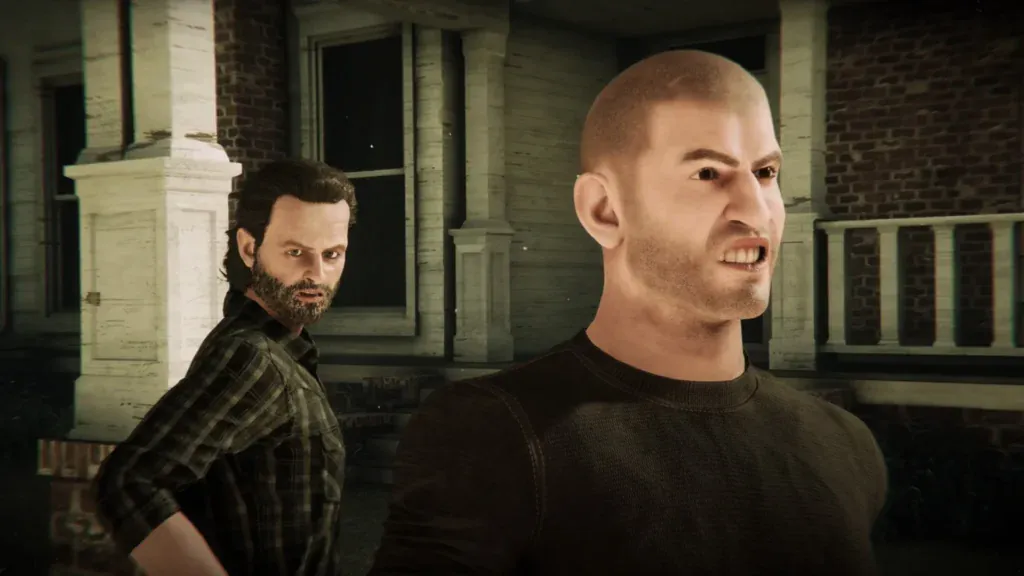
From the very beginning, WDD struggles to establish itself as even a slightly credible adaptation. The game’s initial moments are bogged down by a sluggish start-up screen and technical glitches, setting a grim tone for the journey ahead. Grimmer than an actual apocalypse. Players, step into the role of everyones favourite deputy Rick Grimes, as he awakens in the iconic abandoned hospital in Atlanta. He is greeted not by the shambling undead instead is greeted by unresponsive controls and a puzzling lack of sound, save for the repetitive looping of the series’ iconic theme song.
As the story progresses, the game introduces its “core mechanics” including stealth and decision-making. However, these elements fail to provide any real depth or engagement. The flawed AI of the undead enemies makes stealth tactics largely ineffective, and the games greatly anticipated ‘Defining Choices’ and ‘Group Conflicts’. These mechanics turn out to be superficial, with player decisions having virtually zero impact beyond cosmetic changes to the story.
For example, a potential conflict between group members Merle and T-Dog over a drug addiction can escalate, but no matter how the player intervenes, the outcome feels inconsequential, lacking any meaningful repercussions on character relationships or the broader narrative. These moments highlight the game’s inability to deliver on its promise of branching storylines and player agency.
Its hard to believe that people playing this game aren’t fans of the TV or comic book series, so as far as the story goes it is identical to the TV show. Rick wakes up in hospital, eventually finds his family and then you can make choices like Carl dying…which changed nothing. Whether Rick or Shane win their fight…which changes character models that’s it. And even if you pick Shane, Rick still shows up during the final battle alive and well.
There is a certain point where you can choose for the Governor or Merle to end up with the eyepatch and eventual tank…but this makes no sense. By this point in the story Merle had a change of heart and wanted to join his brother, not destroy his home. Such a mess. After this choice either way the character is referred to as “The Leader of Woodbury” which blatantly proves the lack of effort into this.
Compounding these issues are the game’s technical shortcomings, including monotonous combat, lack lustre graphics, and a general lack of polish. The game’s attempt to emulate Telltale’s narrative-driven approach fails miserably, as player decisions have minimal effect on the overarching plot.
In the end, The Walking Dead: Destinies fails to provide even 1% of compelling gaming experience, lacking the depth and substance necessary to engage players. Its numerous flaws, from technical glitches to shallow gameplay, undermine any potential for immersion or enjoyment. Compared to Telltale’s critically acclaimed adaptation, *Destinies* is little more than a poor imitation, offering an experience that is devoid of consequence or meaning.
Gameplay
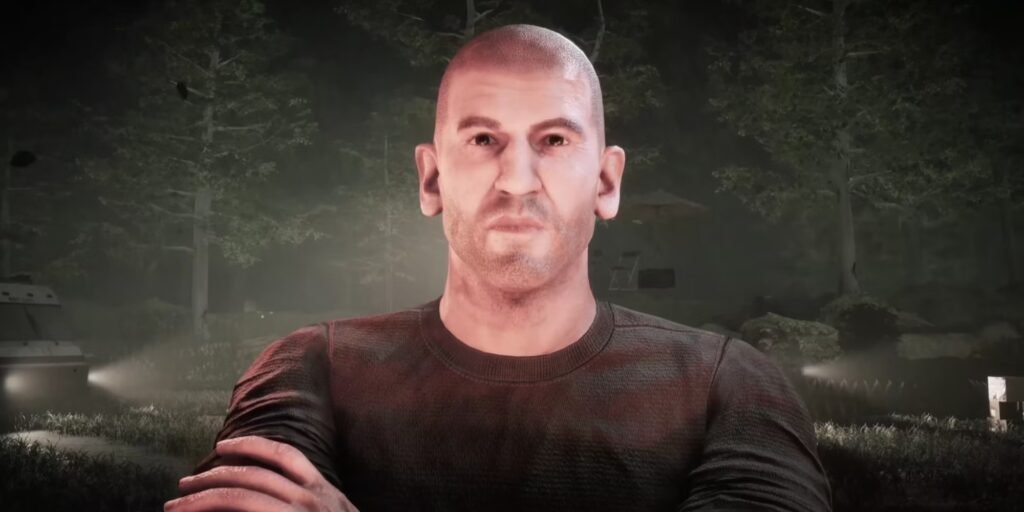
Walking Dead Destinies attempts to blend stealth and combat in incredibly linear missions, both aspects are incredibly barebones. Stealth is marred by bugs, with enemies either spotting you when they shouldn’t or failing to notice you when they should. Combat is equally frustrating, especially the melee combat, which is hindered by a poorly implemented stamina bar that forces players to retreat after nearly every kill.
Even the shooting is basic, while technically a working shooting mechanic it does little to redeem the overall experience. And just for an extra bit of badness, all guns in this universe use the same ammo.
The game’s difficulty ramps up in the cheapest ways possible, often flooding the player with enemies in a manner that only highlights its mechanical flaws. Movement feels awkward and sluggish, with small issues adding up to frequent frustrations, such as coming to a sudden stop when touching minor environmental obstacles. Rather than offering a genuine challenge, the game’s approach to difficulty feels more like an excessive punishment.
The game feels almost physically gross to play.
Graphics and Sound
The Walking Dead: Destinies is just such a mess. The character models are some of the ugliest seen in recent memory, the environments are bland and muddy, and the animations are choppy and janky. The game is plagued by glitches, from entire sections being devoid of enemies to bugs that can block progress. While it’s clear that the game was developed on a tight budget by a small team, even the bare minimum expectations are not met. This game looks like a bad Xbox 360/Playstation 3 title.
It’s often said that some games should never have passed quality control, and The Walking Dead: Destinies is the perfect example of this sentiment. With so many issues, it is astonishing that GameMill Entertainment had the audacity to price it at $50, reflecting a total disregard for delivering a product that is even superficially enjoyable…just like their Kong game.
Replayablity
There is none…that’s about it. I slogged through this game for this review…if it wasn’t for a review I would have stopped after hmmm let’s say about 5 minutes.
Reception and legacy
If you have gotten this far then you must have realised that this game is not good. The reception was universally awful. Metacritic gave it 29/100, IGN and Nintendo Life 2/10, The Jimquisition and Vandal 3/10…which honestly is being very very generous. Open critic gave it a score of 0% recommended which even on opinion based reviews is perfectly correct.
Unfortunately for fans of this universe, this game may have put everything back a few years. One second, we are waiting with bated breath for the new Telltale episode to wishing the developers didn’t even bother making it. The gaming world is currently so fantastic that the levels of games we can play are incredible, but it is still somehow difficult to make a game that works in an existing series. The Walking Dead expansion to the Escapist game was far better.
The mobile games would be better, making a game with the beloved characters going on bog-standard supply runs would be far more fun than this pile of detritus.
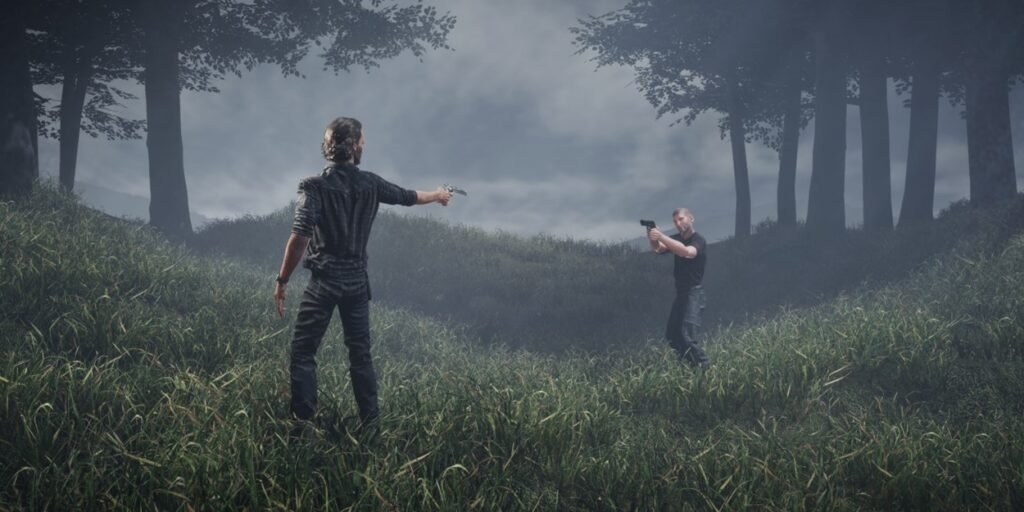
Conclusion
If I hadn’t made myself clear by now, this game sucks. It is so provably terrible that I feel well in my rights as a reviewer, gamer and long-term fan of the Walking Dead series in saying don’t buy this game. If it is in a bargain bin for £2 then treat yourself to a new coaster.
Joys
- I will get back to you on this
Cons
- Awful graphics
- Awful sound
- Awful gameplay
- Awful mechanics
- Badly made
- Just awful
